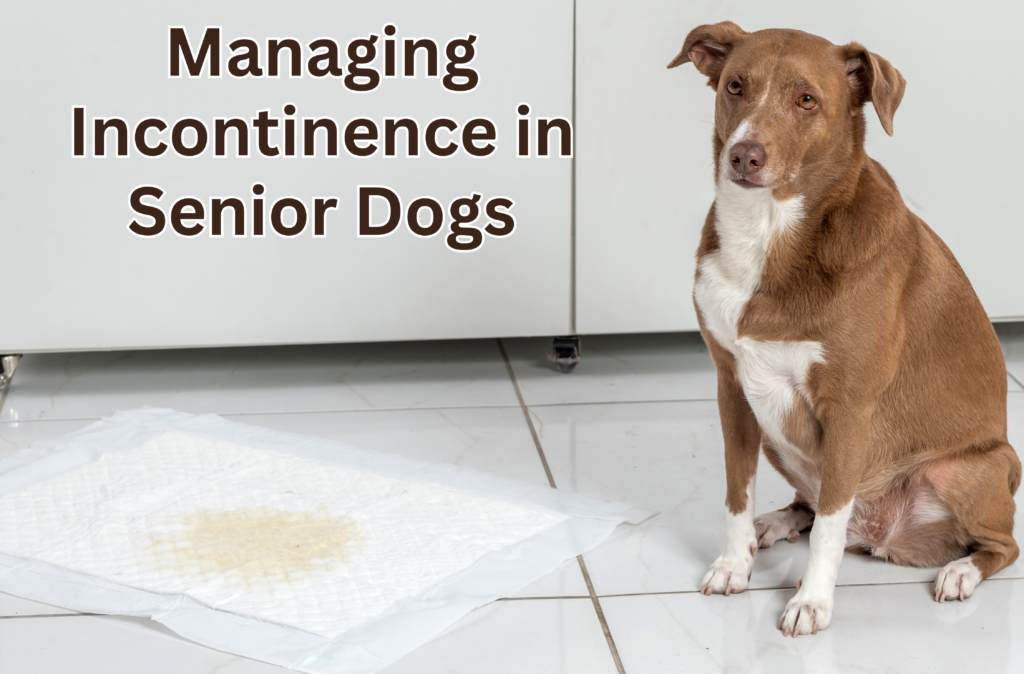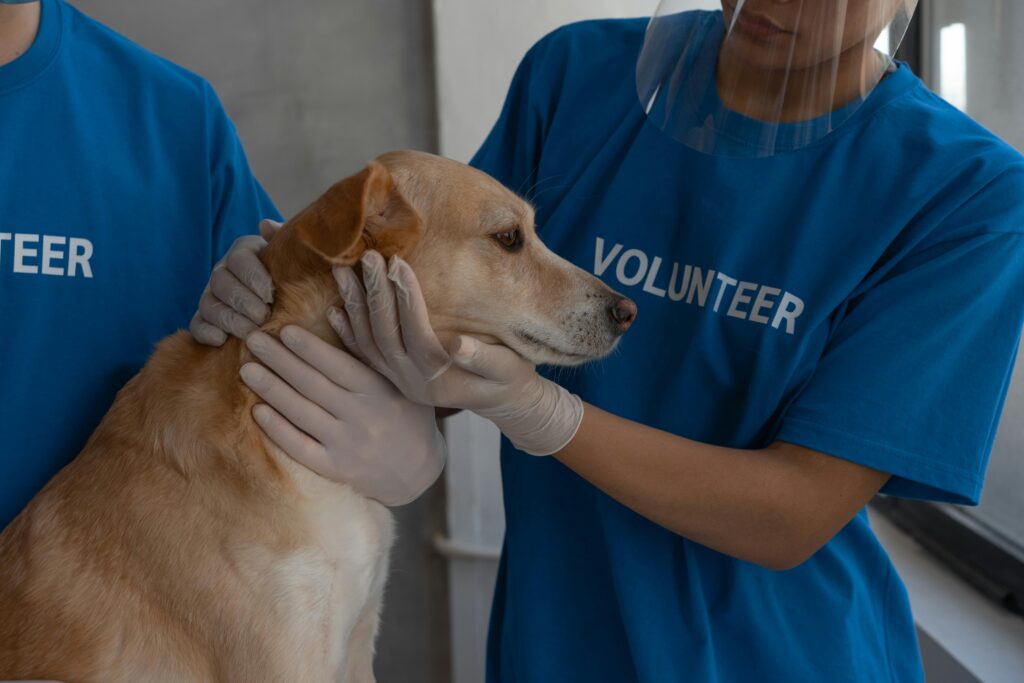
Incontinence is one of the many health issues that can develop in older dogs. Senior dogs frequently experience incontinence, or the inability to control urination or defecation, which can be distressing for both pets and their owners. Your dog’s quality of life can be improved and the situation made easier to manage for you by knowing the causes of incontinence and how to treat it. We’ll look at the causes, symptoms, and treatments for senior dog incontinence in this guide.
What Is Incontinence in Dogs?
Incontinence refers to the involuntary loss of bladder or bowel control. It’s not the same as a house-training issue, where a dog might intentionally eliminate in the wrong place. Instead, incontinence happens when a dog can no longer control its bodily functions, often leading to accidents without the dog realizing it.
In senior dogs, incontinence is more likely to occur due to age-related changes in the body. However, it can also be a symptom of underlying health issues, so it’s important to identify the root cause to provide appropriate care.
Causes of Incontinence in Senior Dogs
Incontinence in senior dogs can be caused by a variety of factors, including:
- Hormonal Changes
In spayed female dogs, hormonal incontinence is a common issue. A drop in estrogen levels can weaken the sphincter muscles, making it harder to control urination. This type of incontinence can often be managed with hormone replacement therapy or other medications. - Urinary Tract Infections (UTIs)
A urinary tract infection can cause inflammation and discomfort, leading to frequent or uncontrolled urination. If your dog has a sudden onset of incontinence, a UTI could be the cause, and antibiotics are usually required for treatment. - Weakened Bladder Muscles
As dogs age, their muscles weaken, including the muscles that control the bladder. A weak bladder may result in urine leakage, especially when the dog is sleeping or relaxed. - Chronic Kidney Disease
Kidney disease is more common in older dogs and can lead to increased thirst and urination, sometimes resulting in incontinence. Managing kidney disease with a vet-approved diet and medications can help alleviate this issue. - Diabetes
Diabetes causes increased thirst and urination, which can lead to accidents. If your dog’s incontinence is accompanied by excessive drinking and weight loss, diabetes could be the underlying cause. - Neurological Disorders
Conditions that affect the brain, spine, or nerves can interfere with a dog’s ability to control its bladder and bowel movements. Neurological issues such as spinal injuries, degenerative myelopathy, or brain tumors may lead to incontinence. - Arthritis or Mobility Issues
In senior dogs, arthritis or other mobility issues may make it difficult for them to get to a designated bathroom area in time. This can lead to accidents, which may seem like incontinence but are actually related to difficulty moving quickly enough. - Cognitive Dysfunction (Canine Dementia)
Older dogs with cognitive dysfunction may forget where or when they’re supposed to eliminate. This confusion can lead to accidents indoors, as they may lose awareness of their bodily functions.
Recognizing Incontinence in Senior Dogs
The signs of incontinence can vary depending on the underlying cause, but common symptoms include:
- Urine leakage while your dog is resting or sleeping.
- Frequent urination in small amounts.
- Dripping urine without your dog being aware of it.
- Dampness or wet spots where your dog has been lying.
- Excessive licking of the genital area due to irritation from urine leakage.
- Occasional fecal incontinence (unintentional defecation).
If you notice any of these signs, it’s important to consult your veterinarian for a proper diagnosis and treatment plan.
Solutions for Managing Incontinence in Senior Dogs

Once your dog’s incontinence is diagnosed, managing the condition becomes the focus. Here are some solutions to help you manage incontinence in your senior dog:
- Veterinary Treatment
If your dog’s incontinence is due to an underlying medical condition like a UTI, kidney disease, or diabetes, your vet will likely prescribe medication or recommend dietary changes. Hormone replacement therapy may be suggested for spayed female dogs with hormone-related incontinence. - Medications
There are medications available that can strengthen the bladder muscles or improve the tone of the urethra, helping to reduce leakage. Phenylpropanolamine (PPA) is commonly prescribed to help with urinary incontinence in dogs. - Incontinence Products
There are a variety of products designed to help manage incontinence, including:- Dog Diapers: Dog diapers can be used to catch urine and prevent accidents from making a mess. Make sure to choose the right size for your dog, and change them frequently to prevent skin irritation.
- Absorbent Pads: Place absorbent pads in areas where your dog sleeps or rests to soak up any urine that may leak.
- Waterproof Bedding: Waterproof covers for beds and furniture can help protect your home from accidents while keeping your dog comfortable.
- Regular Bathroom Breaks
Increase the frequency of bathroom breaks, especially after meals or naps. Encouraging your dog to eliminate more often can help reduce the chances of accidents. - Dietary Adjustments
If your dog has kidney disease or diabetes, your vet may recommend a specialized diet to help manage the condition. A proper diet can reduce the need for excessive urination and help manage incontinence. - Maintain a Clean and Comfortable Environment
Keeping your senior dog’s living area clean and dry is important to prevent skin infections or irritation caused by urine leakage. Frequent baths and using pet-friendly wipes can help keep your dog comfortable. - Physical Therapy and Exercise
If your dog’s incontinence is related to weakened muscles or mobility issues, physical therapy or gentle exercise can strengthen their muscles and improve bladder control. Regular walks and targeted exercises can help maintain muscle tone.
When to Seek Veterinary Help
Incontinence can sometimes be a sign of a more serious underlying health issue, so it’s important to consult your vet if you notice any sudden changes in your dog’s bathroom habits. Your vet will perform a thorough examination and may recommend blood tests, urinalysis, or imaging to determine the cause of the incontinence.
Final Thoughts
Incontinence in senior dogs can be challenging to manage, but with the right care, you can keep your dog comfortable and maintain a clean environment. Understanding the causes and solutions will allow you to take proactive steps to address the issue and improve your dog’s quality of life. Whether through medication, lifestyle adjustments, or incontinence products, your senior dog can still enjoy a happy, healthy life with proper management of their condition.
